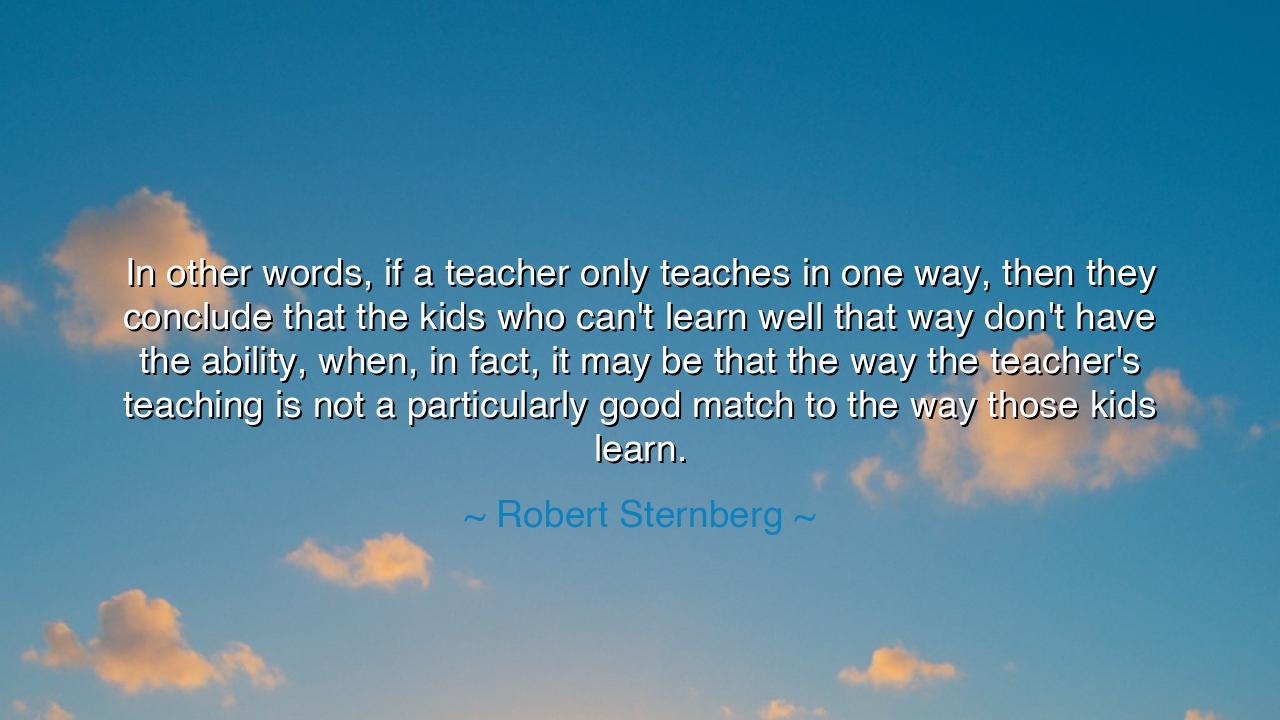
In other words, if a teacher only teaches in one way, then they
In other words, if a teacher only teaches in one way, then they conclude that the kids who can't learn well that way don't have the ability, when, in fact, it may be that the way the teacher's teaching is not a particularly good match to the way those kids learn.






Robert Sternberg, seeker of wisdom in the science of the mind, spoke with clarity when he said: “In other words, if a teacher only teaches in one way, then they conclude that the kids who can't learn well that way don't have the ability, when, in fact, it may be that the way the teacher's teaching is not a particularly good match to the way those kids learn.” In this truth lies a warning against the blindness of pride, and an exaltation of humility. For learning is not one road but many paths, winding through the forests of thought. And the teacher, if he is to guide, must not chain himself to a single trail, but must walk with his students through their own doorways of understanding.
The origin of this saying rests in Sternberg’s lifelong labor to reveal the diverse powers of human intelligence. He knew that the mind is not a single lamp, burning brighter in some and dimmer in others, but a constellation of lights, each glowing in its own way. Some learn through words, others through hands, others through vision, music, or motion. To insist upon one method is to blind oneself to the richness of the human soul. The error of the rigid teacher is not that the child lacks ability, but that the teaching fails to reach the child’s inner song.
Consider the tale of Helen Keller. Born into darkness and silence, she was judged by many as incapable of learning. Teachers despaired, and society turned away. Yet it was Anne Sullivan who refused the lie of impossibility. She did not cling to one method, but reached into Helen’s world with her hands, spelling words into her palm, opening gates through the sense that still burned bright. Where others had declared failure, Sullivan discovered brilliance. Helen, once considered lost, became a voice of power, an author, and an inspiration to the world. This story is a living embodiment of Sternberg’s words: it was not Helen who lacked ability, but the world that lacked imagination in its teaching.
So too, in the life of every child, lies a spark waiting for the right breath to fan it into flame. One who teaches with patience, who bends his art to the learner, becomes as a gardener who knows that each seed grows in its own way. The oak demands years of deep soil, the vine clings and climbs, the lily opens with the touch of light. To judge the oak by the measure of the lily, or the lily by the vine, is to see nothing but failure. Yet to nurture each according to its nature is to behold a garden of marvels. Such is the true calling of the teacher.
The lesson here is both humbling and empowering: we must not brand others as incapable because they do not thrive in the narrow way we expect. The fault may not lie in their ability, but in our unwillingness to adapt. This truth extends beyond schools into the heart of all human dealings — in families, in work, in friendship. We err when we demand that others fit our single mold; we grow wise when we learn to see the world through their eyes.
What then shall we practice? Let us listen before we judge. Let us offer many ways of teaching, many ways of explaining, until the spark ignites. Let parents watch their children closely, seeking not to impose their own path, but to honor the child’s way of walking. Let leaders in every craft and station recognize that not all minds climb ladders the same way, yet all may reach the summit if guided with patience and creativity.
And so, O seekers of wisdom, remember Sternberg’s teaching: the measure of a true teacher is not in the ease of the lesson delivered, but in the light awakened in the student. To believe in the potential of every mind, to adapt one’s method until that potential shines forth, is to serve the highest calling of humanity. For when we open many doors, we discover that all can learn, and that the diversity of minds is not a weakness but the very strength of mankind.






AAdministratorAdministrator
Welcome, honored guests. Please leave a comment, we will respond soon